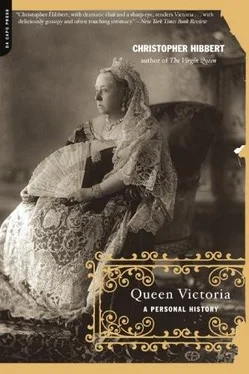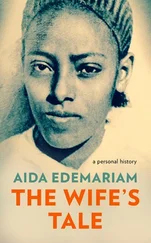Christopher Hibbert - QUEEN VICTORIA A Personal History
Здесь есть возможность читать онлайн «Christopher Hibbert - QUEEN VICTORIA A Personal History» — ознакомительный отрывок электронной книги совершенно бесплатно, а после прочтения отрывка купить полную версию. В некоторых случаях можно слушать аудио, скачать через торрент в формате fb2 и присутствует краткое содержание. Жанр: Биографии и Мемуары, на английском языке. Описание произведения, (предисловие) а так же отзывы посетителей доступны на портале библиотеки ЛибКат.
- Название:QUEEN VICTORIA A Personal History
- Автор:
- Жанр:
- Год:неизвестен
- ISBN:нет данных
- Рейтинг книги:5 / 5. Голосов: 1
-
Избранное:Добавить в избранное
- Отзывы:
-
Ваша оценка:
- 100
- 1
- 2
- 3
- 4
- 5
QUEEN VICTORIA A Personal History: краткое содержание, описание и аннотация
Предлагаем к чтению аннотацию, описание, краткое содержание или предисловие (зависит от того, что написал сам автор книги «QUEEN VICTORIA A Personal History»). Если вы не нашли необходимую информацию о книге — напишите в комментариях, мы постараемся отыскать её.
QUEEN VICTORIA A Personal History — читать онлайн ознакомительный отрывок
Ниже представлен текст книги, разбитый по страницам. Система сохранения места последней прочитанной страницы, позволяет с удобством читать онлайн бесплатно книгу «QUEEN VICTORIA A Personal History», без необходимости каждый раз заново искать на чём Вы остановились. Поставьте закладку, и сможете в любой момент перейти на страницу, на которой закончили чтение.
Интервал:
Закладка:
Well aware of the system being adopted at Kensington, the Duchess of Clarence wrote to her sister-in-law to advise her against a policy which was attributed - 'rightly or wrongly', she could not judge - to Sir John Conroy, 'a man of merit' but one whose family was 'not of so high a rank that they alone should be the entourage and companions of the future Queen of England'. She must not allow Conroy to exercise 'too much influence over her but keep him in his place'. The Duchess of Kent, a willing accomplice in the 'system', paid no attention. 6
As well as being separated from the Royal Family, the Princess must also be shielded from any English lady who might have undesirable connections and friends; and Baroness Lehzen, being German, and 'entirely dependent' upon the Duchess, happily had none of these. The Princess must also, like her mother, 'acquire popularity and a wide following', clearly distinguishing her from all her dissolute relations.
Fortunately, though little was known about her, the glimpses which the public were permitted to see had already created a favourable impression of Princess Victoria. She had been seen riding her white donkey in Kensington Gardens with 'an old soldier, a former retainer of her father's, leading her bridle rein', 'riding in a pony chaise over the gravel walks, led by a page', and walking along the paths there followed by a very tall footman looking like 'a gigantic fairy'. 7Lord Albemarle, a member of the Duke of Sussex's household, had watched from a window of the Palace 'a bright, pretty little girl' in a large white hat 'impartially' dividing the contents of a watering can 'between the flowers and her own little feet'. 8Charles Knight, the publisher, also caught a glimpse of her one day having breakfast with her mother on the lawn outside Kensington Palace and running off to pick a flower in the adjoining meadow. 'I passed on,' Knight wrote, 'and blessed her.' 9
Charles Greville saw her at a children's ball, given by the King and attended by the ten-year-old Queen of Portugal, and he thought that 'our little Princess' was a 'short, vulgar-looking child, and not near so good-looking as the Portuguese'. 10But this was not a characteristic verdict. Most of those few people who came across her were more likely to share the opinion of Lady Wharncliffe, who was invited to dinner at Kensington where the Princess was occasionally allowed down from her bedroom to sit at the table, eating her 'bread and milk out of a small silver basin'. Lady Wharncliffe was delighted with 'our little future Queen'.
She is very much grown, though short for her age [she wrote],has a nice countenance and distingue figure, tho' not very good; and her manner the most perfect mixture of childishness and civility I ever saw. She is born a Princess without the least appearance of art or affectation ... When she went to bed we all stood up and after kissing Aunt Sophia, she curtsied, first to one side, and then the other, to all the Ladies, and then walked off with her governess. She is really very accomplished by taste , being very fond both of music and drawing, but fondest of all of her dolls . In short I look to her to save us from Democracy, for it is impossible she should not be popular when she is older and more seen. 11
The Duke of Wellington's friend, Harriet Arbuthnot, was equally taken with the little girl, 'the most charming child' she ever saw. 'She is a fine, beautifully made, handsome creature,' Mrs Arbuthnot continued, 'quite playful & childish [she was nearly nine], playing with her dolls and in high spirits, but civil & well bred & Princess-like to the greatest degree.' 12She was graceful in her movements and walked with a regal air, an accomplishment attributed to her having had to submit on occasions to a bunch of prickly holly pinned to the front of her dress to keep her head up.
It was not until she was nearly eleven years old that the Princess learned how near she was to the throne. Of course, she knew that she was an honoured little personage. Servants behaved to her with noticeable deference; when she was out walking, gentlemen touched or raised their hats to her. She herself once told a child who put a hand out to play with her toys, 'You must not touch those, they are mine. And I may call you Jane but you must not call me Victoria.' According to Baroness Lehzen, a few days after her charge had been cross-examined by the Bishops of London and Lincoln, and having discussed the matter with the Duchess of Kent, the Baroness placed a genealogical table into one of the Princess's history books. 'I never saw that before,' Victoria said; and, after examining the table, she commented, 'I see I am nearer to the throne than I thought. ' 13She then burst into tears. Lehzen reminded her that Aunt Adelaide was still young and might yet have children and, of course, if she did, it was they who would ascend the throne after their father died.
A few weeks later, on 26 June 1830, King George IV died at Windsor Castle and the short reign of King William IV began.
Chapter 5
PROGRESSES
'When one arrives at any nobleman's seat, one must instantly dress for dinner and consequently I could never rest properly.'
When she was two years old, Princess Victoria had received a letter from her 'truly affectionate Aunt', the Duchess of Clarence, in which the Duchess referred to her as 'my dear little Heart'; and, when she lost her second baby daughter, she wrote to the Duchess of Kent to say 'My children are dead, but yours lives and She is mine too.' 1
A good-natured, unselfish and religious woman, almost thirty years younger than her husband, she was quite sincere in expressing these sentiments, and upon his accession to the throne she was as kind to her little niece as ever, doing all she could to persuade her guardians at Kensington to allow her to appear at Court. Her husband also strongly expressed his wish to see her there.
On becoming King, William, as good-natured as his wife, 'began immediately to do good-natured things'. He clearly loved being a king; and, excited by his rank, he strode about the London streets, nodding cheerfully to right and left, relishing his popularity. Expressing a general opinion, Charles Greville said that he was 'a kind-hearted, well-meaning ... bustling old fellow [sixty-five years of age] and, if he doesn't go mad, may make a very decent King.' Contrasting his gregarious familiarity with the seclusion in which his predecessor had chosen to spend the last years of his life, the Duke of Wellington, the Prime Minister, told Dorothea Lieven that this was not so much a new reign; it was 'a new dynasty'. At Kensington Palace, however, the new reign had no effect whatsoever upon the 'system' practised there. Sir John Conroy remained as the Duchess of Kent's Comptroller, organizing the household and all the particularities of its life, telling the Duchess to report to him upon 'everything' that happened to the Princess down to the 'smallest and insignificant detail'. As soon as he heard of King George IV's death, Conroy wrote a letter which, signed by the Duchess, was sent to the Duke of Wellington for onward transmission to King William IV. This letter, referring to Princess Victoria as now being 'more than Heiress Presumptive' to the throne, required the appointment of the Duchess as Regent 'without any interference whatsoever'. It also required the appointment of an English lady of rank to be appointed governess to the Princess, superseding Baroness Lehzen, and requested the recognition of the Duchess as Dowager Princess of Wales with an increased allowance for her in her new position in the kingdom.
Dismayed by both the tone and the contents of this importunate letter, Wellington replied that he earnestly entreated her Royal Highness to allow him to consider it as 'a Private and Confidential Communication; or rather as never having been written'. 2Angered by this rebuff, the Duchess, advised by Conroy, immediately returned a sharp reply, contending that she would find it irksome to be Regent but that she owed it to her conscience for her daughter's sake to undertake the duty. Wellington answered her letter in a mollifying tone but thought it as well to offer a guarded warning by urging her Royal Highness 'not to allow any Person' to persuade her to entertain the idea that there was any 'Party or Individual of influence in the Country' who wished to injure the interests of the Duchess and her daughter. Deeply offended by this reference to her Comptroller, the Duchess declined to see the Duke when he proposed to bring her a draft of a Regency Bill, telling him to communicate with Sir John Conroy, and refusing to talk to him for 'a long time after'. 3The Regency Bill, introduced by the Lord Chancellor in Lord Grey's government which succeeded Wellington's in November 1830, did, however, provide for her appointment as sole Regent in the event of King William dying before her daughter reached the age of eighteen, the House of Commons recoiling in horror from the thought that the dreadful Duke of Cumberland might otherwise lay claim to share the appointment with her. When she was told of Parliament's decision, the Duchess, reduced to tears, said that it gave her more pleasure than anything else had done since the death of her husband. 4
Читать дальшеИнтервал:
Закладка:
Похожие книги на «QUEEN VICTORIA A Personal History»
Представляем Вашему вниманию похожие книги на «QUEEN VICTORIA A Personal History» списком для выбора. Мы отобрали схожую по названию и смыслу литературу в надежде предоставить читателям больше вариантов отыскать новые, интересные, ещё непрочитанные произведения.
Обсуждение, отзывы о книге «QUEEN VICTORIA A Personal History» и просто собственные мнения читателей. Оставьте ваши комментарии, напишите, что Вы думаете о произведении, его смысле или главных героях. Укажите что конкретно понравилось, а что нет, и почему Вы так считаете.











